Taxation Advice for RIP Pty Ltd: Funeral Services and Income Tax Implications
VerifiedAdded on 2024/05/30
|9
|2131
|168
AI Summary
This report provides comprehensive tax advice to RIP Pty Ltd, a company providing funeral services. It analyzes the taxability of income, including advance payments and forfeited amounts, the deductibility of expenses, and the treatment of trading stock, dividends, prepaid expenses, and long service leave provisions. The report also examines the classification of capital and revenue expenditures, applying relevant Australian tax legislation and case law, particularly the Arthur Murray v FCT case, to ensure compliance with tax obligations.
Contribute Materials
Your contribution can guide someone’s learning journey. Share your
documents today.
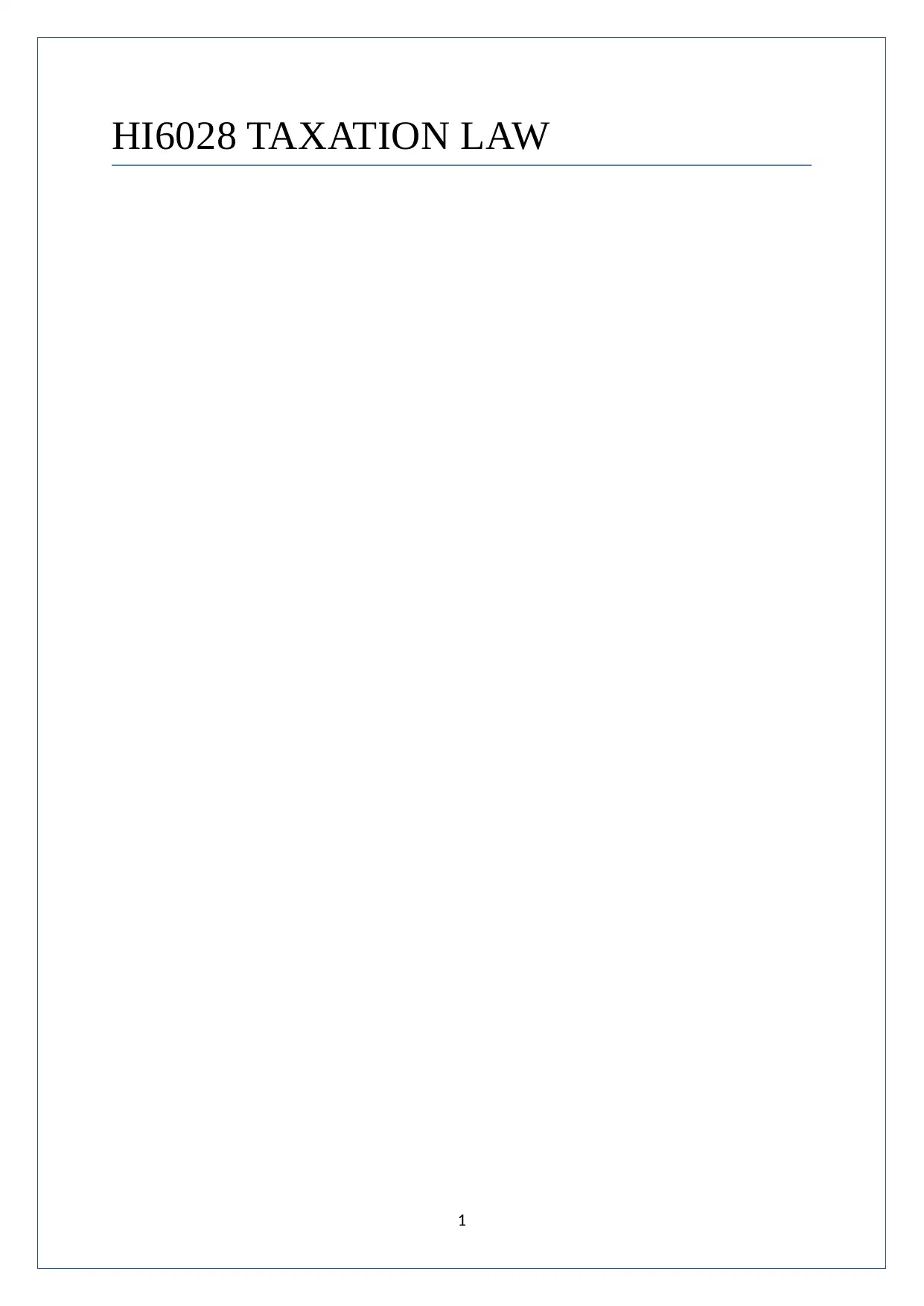
HI6028 TAXATION LAW
1
1
Secure Best Marks with AI Grader
Need help grading? Try our AI Grader for instant feedback on your assignments.
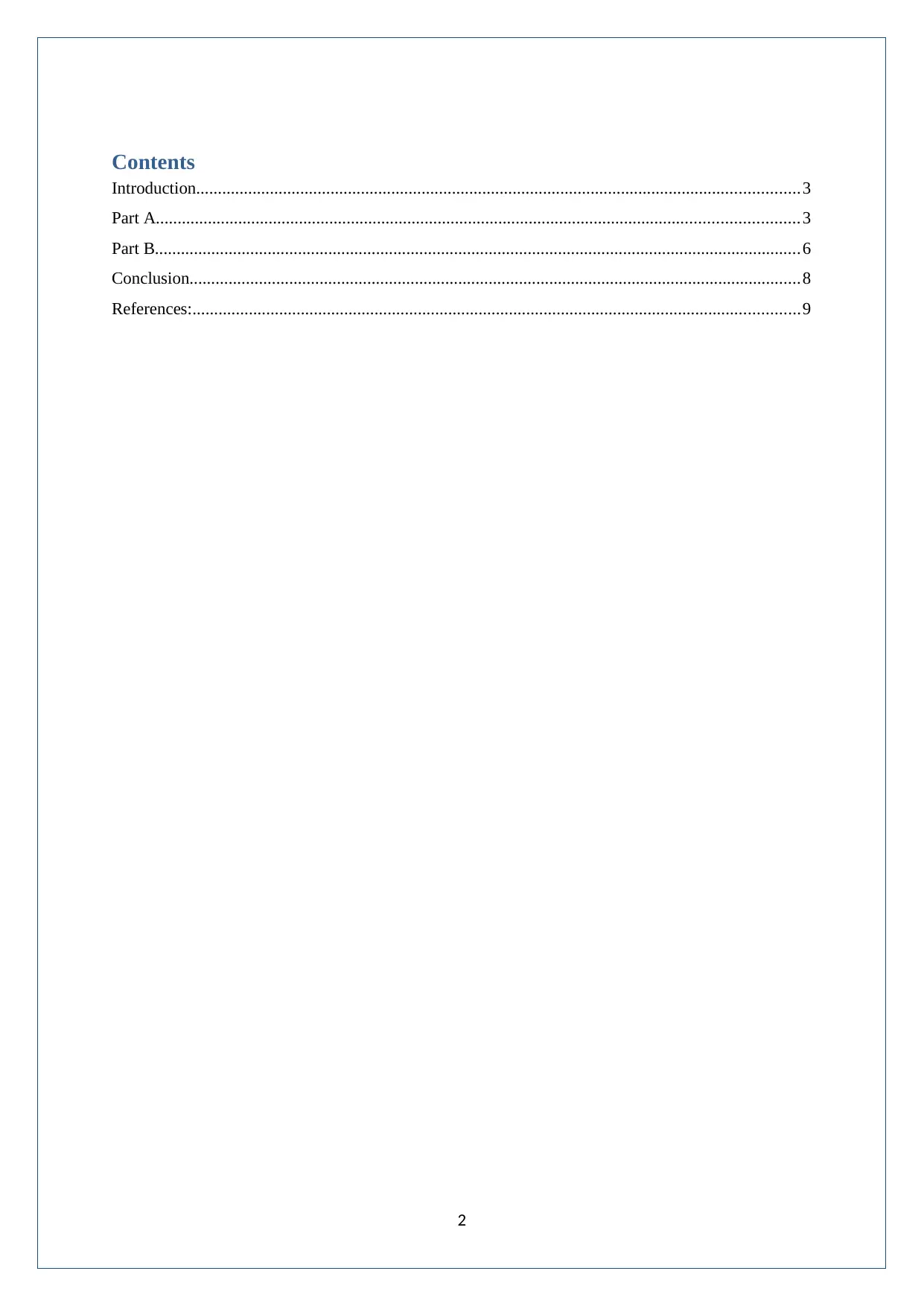
Contents
Introduction...........................................................................................................................................3
Part A....................................................................................................................................................3
Part B.....................................................................................................................................................6
Conclusion.............................................................................................................................................8
References:............................................................................................................................................9
2
Introduction...........................................................................................................................................3
Part A....................................................................................................................................................3
Part B.....................................................................................................................................................6
Conclusion.............................................................................................................................................8
References:............................................................................................................................................9
2
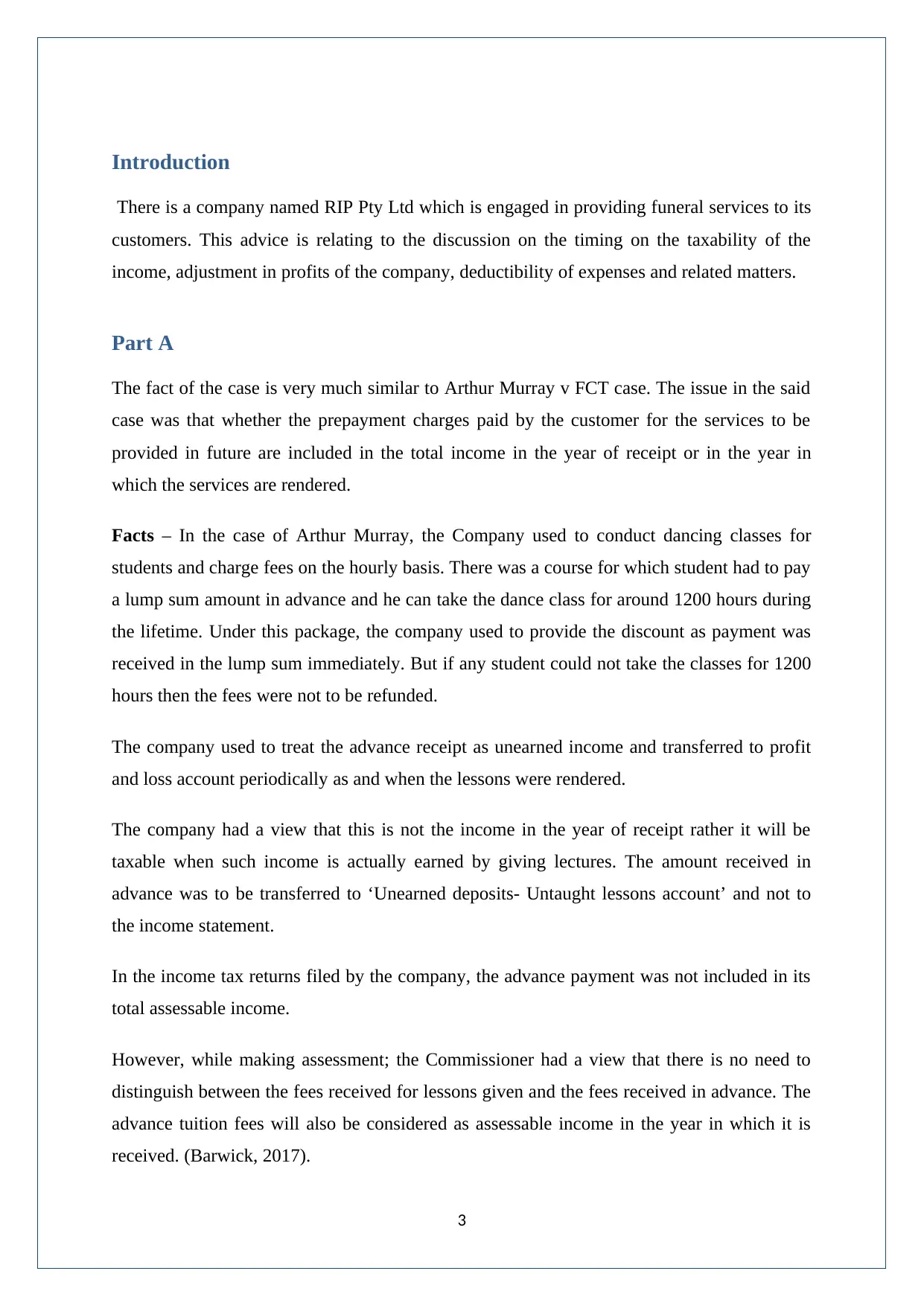
Introduction
There is a company named RIP Pty Ltd which is engaged in providing funeral services to its
customers. This advice is relating to the discussion on the timing on the taxability of the
income, adjustment in profits of the company, deductibility of expenses and related matters.
Part A
The fact of the case is very much similar to Arthur Murray v FCT case. The issue in the said
case was that whether the prepayment charges paid by the customer for the services to be
provided in future are included in the total income in the year of receipt or in the year in
which the services are rendered.
Facts – In the case of Arthur Murray, the Company used to conduct dancing classes for
students and charge fees on the hourly basis. There was a course for which student had to pay
a lump sum amount in advance and he can take the dance class for around 1200 hours during
the lifetime. Under this package, the company used to provide the discount as payment was
received in the lump sum immediately. But if any student could not take the classes for 1200
hours then the fees were not to be refunded.
The company used to treat the advance receipt as unearned income and transferred to profit
and loss account periodically as and when the lessons were rendered.
The company had a view that this is not the income in the year of receipt rather it will be
taxable when such income is actually earned by giving lectures. The amount received in
advance was to be transferred to ‘Unearned deposits- Untaught lessons account’ and not to
the income statement.
In the income tax returns filed by the company, the advance payment was not included in its
total assessable income.
However, while making assessment; the Commissioner had a view that there is no need to
distinguish between the fees received for lessons given and the fees received in advance. The
advance tuition fees will also be considered as assessable income in the year in which it is
received. (Barwick, 2017).
3
There is a company named RIP Pty Ltd which is engaged in providing funeral services to its
customers. This advice is relating to the discussion on the timing on the taxability of the
income, adjustment in profits of the company, deductibility of expenses and related matters.
Part A
The fact of the case is very much similar to Arthur Murray v FCT case. The issue in the said
case was that whether the prepayment charges paid by the customer for the services to be
provided in future are included in the total income in the year of receipt or in the year in
which the services are rendered.
Facts – In the case of Arthur Murray, the Company used to conduct dancing classes for
students and charge fees on the hourly basis. There was a course for which student had to pay
a lump sum amount in advance and he can take the dance class for around 1200 hours during
the lifetime. Under this package, the company used to provide the discount as payment was
received in the lump sum immediately. But if any student could not take the classes for 1200
hours then the fees were not to be refunded.
The company used to treat the advance receipt as unearned income and transferred to profit
and loss account periodically as and when the lessons were rendered.
The company had a view that this is not the income in the year of receipt rather it will be
taxable when such income is actually earned by giving lectures. The amount received in
advance was to be transferred to ‘Unearned deposits- Untaught lessons account’ and not to
the income statement.
In the income tax returns filed by the company, the advance payment was not included in its
total assessable income.
However, while making assessment; the Commissioner had a view that there is no need to
distinguish between the fees received for lessons given and the fees received in advance. The
advance tuition fees will also be considered as assessable income in the year in which it is
received. (Barwick, 2017).
3
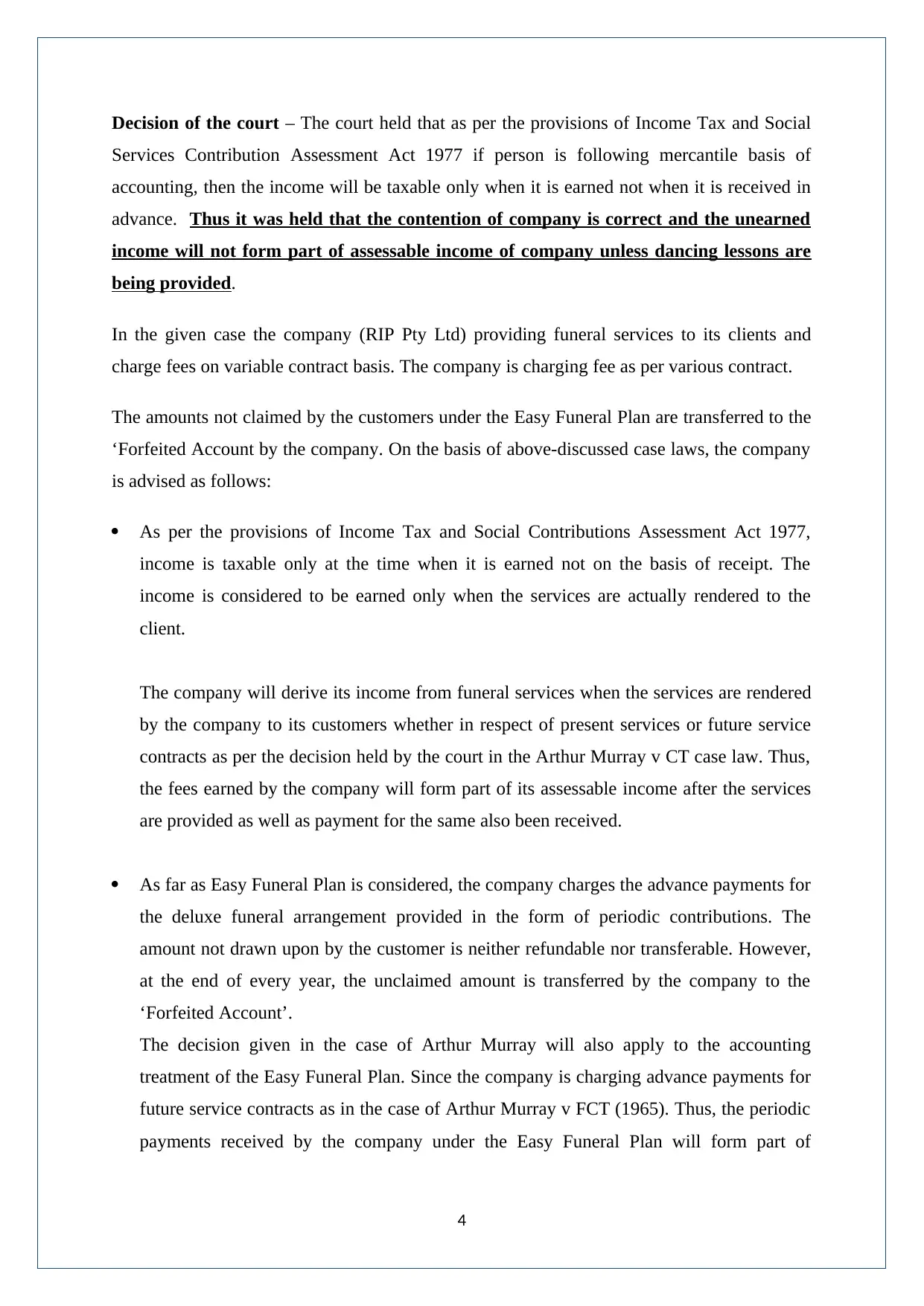
Decision of the court – The court held that as per the provisions of Income Tax and Social
Services Contribution Assessment Act 1977 if person is following mercantile basis of
accounting, then the income will be taxable only when it is earned not when it is received in
advance. Thus it was held that the contention of company is correct and the unearned
income will not form part of assessable income of company unless dancing lessons are
being provided.
In the given case the company (RIP Pty Ltd) providing funeral services to its clients and
charge fees on variable contract basis. The company is charging fee as per various contract.
The amounts not claimed by the customers under the Easy Funeral Plan are transferred to the
‘Forfeited Account by the company. On the basis of above-discussed case laws, the company
is advised as follows:
As per the provisions of Income Tax and Social Contributions Assessment Act 1977,
income is taxable only at the time when it is earned not on the basis of receipt. The
income is considered to be earned only when the services are actually rendered to the
client.
The company will derive its income from funeral services when the services are rendered
by the company to its customers whether in respect of present services or future service
contracts as per the decision held by the court in the Arthur Murray v CT case law. Thus,
the fees earned by the company will form part of its assessable income after the services
are provided as well as payment for the same also been received.
As far as Easy Funeral Plan is considered, the company charges the advance payments for
the deluxe funeral arrangement provided in the form of periodic contributions. The
amount not drawn upon by the customer is neither refundable nor transferable. However,
at the end of every year, the unclaimed amount is transferred by the company to the
‘Forfeited Account’.
The decision given in the case of Arthur Murray will also apply to the accounting
treatment of the Easy Funeral Plan. Since the company is charging advance payments for
future service contracts as in the case of Arthur Murray v FCT (1965). Thus, the periodic
payments received by the company under the Easy Funeral Plan will form part of
4
Services Contribution Assessment Act 1977 if person is following mercantile basis of
accounting, then the income will be taxable only when it is earned not when it is received in
advance. Thus it was held that the contention of company is correct and the unearned
income will not form part of assessable income of company unless dancing lessons are
being provided.
In the given case the company (RIP Pty Ltd) providing funeral services to its clients and
charge fees on variable contract basis. The company is charging fee as per various contract.
The amounts not claimed by the customers under the Easy Funeral Plan are transferred to the
‘Forfeited Account by the company. On the basis of above-discussed case laws, the company
is advised as follows:
As per the provisions of Income Tax and Social Contributions Assessment Act 1977,
income is taxable only at the time when it is earned not on the basis of receipt. The
income is considered to be earned only when the services are actually rendered to the
client.
The company will derive its income from funeral services when the services are rendered
by the company to its customers whether in respect of present services or future service
contracts as per the decision held by the court in the Arthur Murray v CT case law. Thus,
the fees earned by the company will form part of its assessable income after the services
are provided as well as payment for the same also been received.
As far as Easy Funeral Plan is considered, the company charges the advance payments for
the deluxe funeral arrangement provided in the form of periodic contributions. The
amount not drawn upon by the customer is neither refundable nor transferable. However,
at the end of every year, the unclaimed amount is transferred by the company to the
‘Forfeited Account’.
The decision given in the case of Arthur Murray will also apply to the accounting
treatment of the Easy Funeral Plan. Since the company is charging advance payments for
future service contracts as in the case of Arthur Murray v FCT (1965). Thus, the periodic
payments received by the company under the Easy Funeral Plan will form part of
4
Secure Best Marks with AI Grader
Need help grading? Try our AI Grader for instant feedback on your assignments.
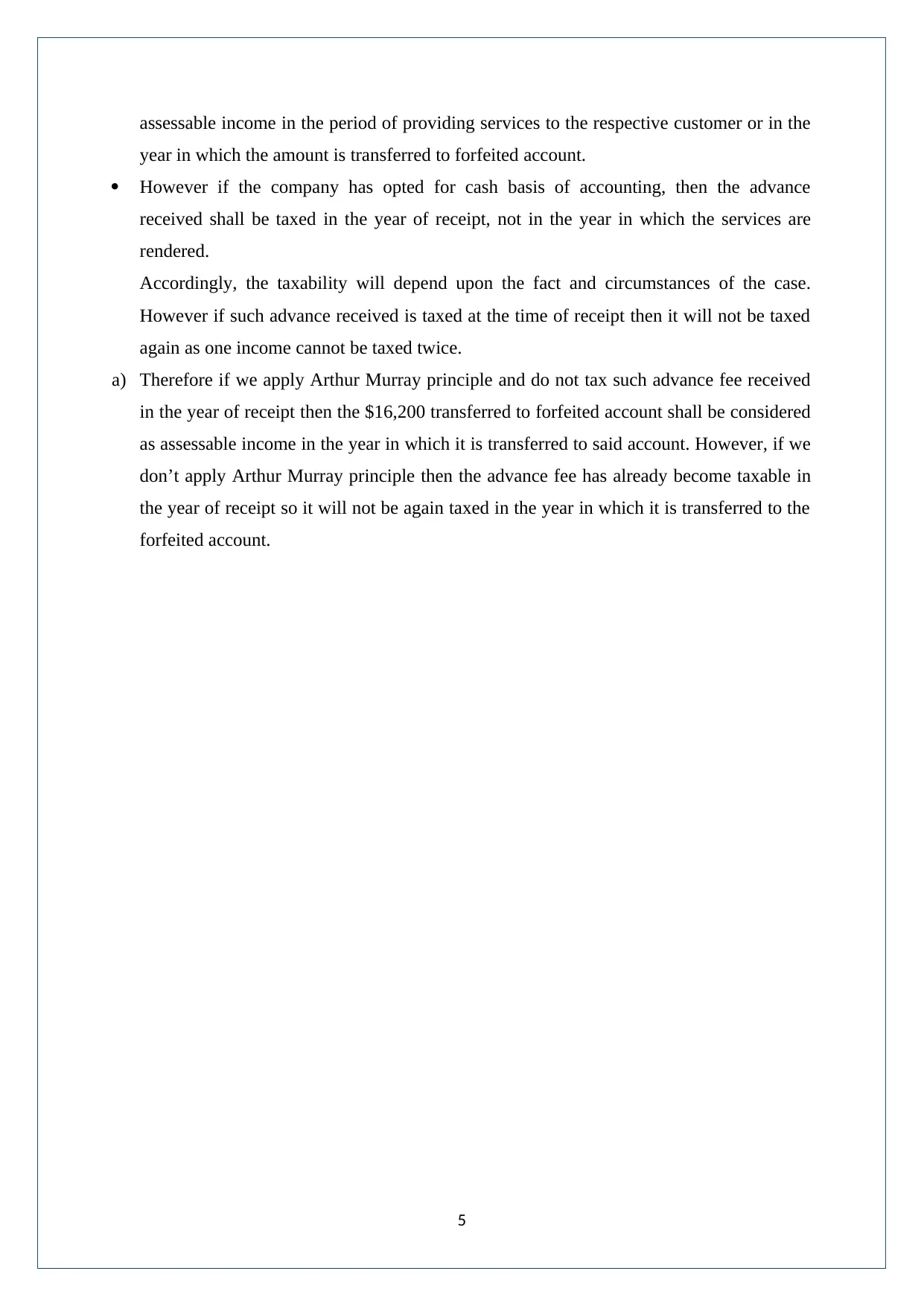
assessable income in the period of providing services to the respective customer or in the
year in which the amount is transferred to forfeited account.
However if the company has opted for cash basis of accounting, then the advance
received shall be taxed in the year of receipt, not in the year in which the services are
rendered.
Accordingly, the taxability will depend upon the fact and circumstances of the case.
However if such advance received is taxed at the time of receipt then it will not be taxed
again as one income cannot be taxed twice.
a) Therefore if we apply Arthur Murray principle and do not tax such advance fee received
in the year of receipt then the $16,200 transferred to forfeited account shall be considered
as assessable income in the year in which it is transferred to said account. However, if we
don’t apply Arthur Murray principle then the advance fee has already become taxable in
the year of receipt so it will not be again taxed in the year in which it is transferred to the
forfeited account.
5
year in which the amount is transferred to forfeited account.
However if the company has opted for cash basis of accounting, then the advance
received shall be taxed in the year of receipt, not in the year in which the services are
rendered.
Accordingly, the taxability will depend upon the fact and circumstances of the case.
However if such advance received is taxed at the time of receipt then it will not be taxed
again as one income cannot be taxed twice.
a) Therefore if we apply Arthur Murray principle and do not tax such advance fee received
in the year of receipt then the $16,200 transferred to forfeited account shall be considered
as assessable income in the year in which it is transferred to said account. However, if we
don’t apply Arthur Murray principle then the advance fee has already become taxable in
the year of receipt so it will not be again taxed in the year in which it is transferred to the
forfeited account.
5
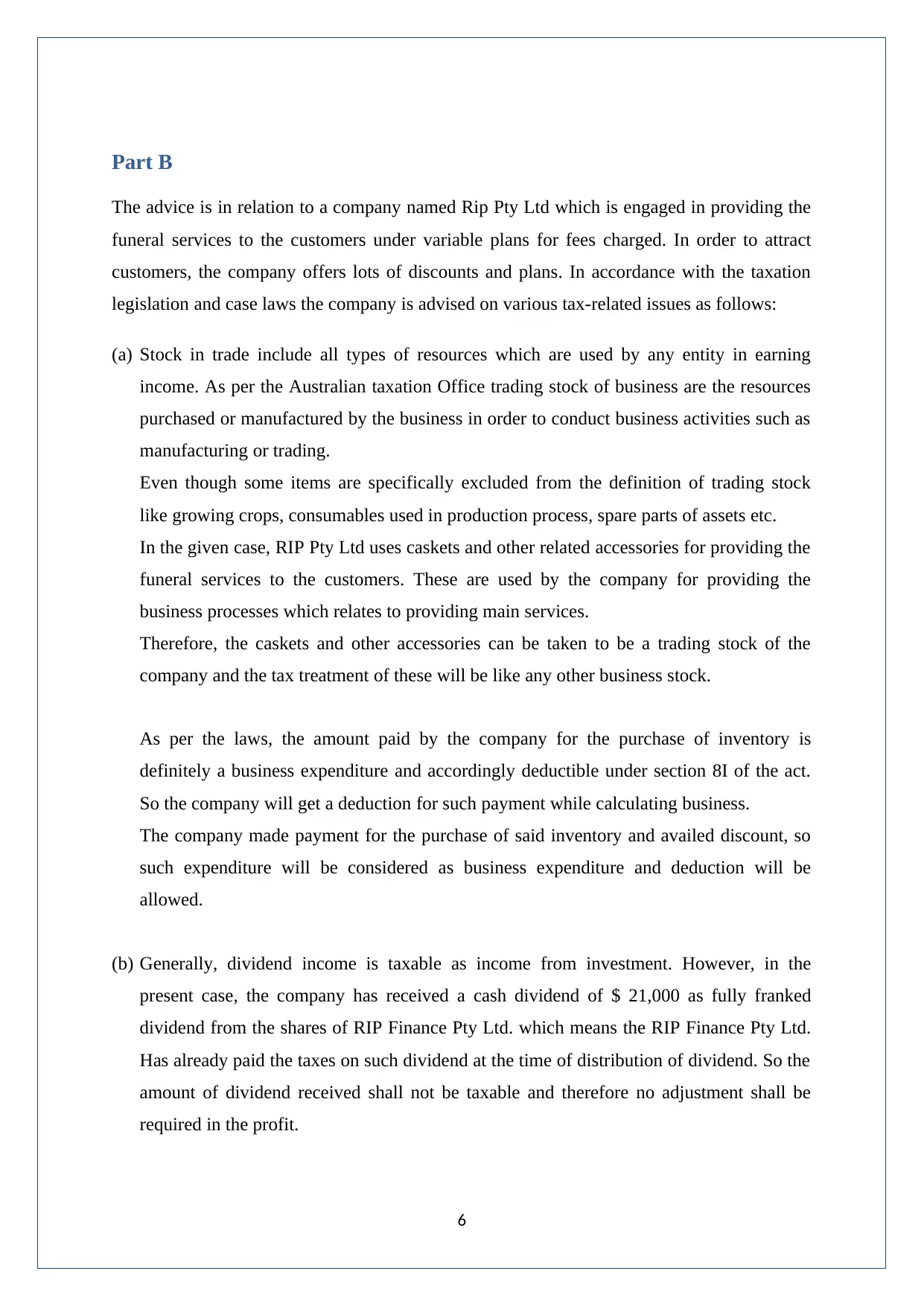
Part B
The advice is in relation to a company named Rip Pty Ltd which is engaged in providing the
funeral services to the customers under variable plans for fees charged. In order to attract
customers, the company offers lots of discounts and plans. In accordance with the taxation
legislation and case laws the company is advised on various tax-related issues as follows:
(a) Stock in trade include all types of resources which are used by any entity in earning
income. As per the Australian taxation Office trading stock of business are the resources
purchased or manufactured by the business in order to conduct business activities such as
manufacturing or trading.
Even though some items are specifically excluded from the definition of trading stock
like growing crops, consumables used in production process, spare parts of assets etc.
In the given case, RIP Pty Ltd uses caskets and other related accessories for providing the
funeral services to the customers. These are used by the company for providing the
business processes which relates to providing main services.
Therefore, the caskets and other accessories can be taken to be a trading stock of the
company and the tax treatment of these will be like any other business stock.
As per the laws, the amount paid by the company for the purchase of inventory is
definitely a business expenditure and accordingly deductible under section 8I of the act.
So the company will get a deduction for such payment while calculating business.
The company made payment for the purchase of said inventory and availed discount, so
such expenditure will be considered as business expenditure and deduction will be
allowed.
(b) Generally, dividend income is taxable as income from investment. However, in the
present case, the company has received a cash dividend of $ 21,000 as fully franked
dividend from the shares of RIP Finance Pty Ltd. which means the RIP Finance Pty Ltd.
Has already paid the taxes on such dividend at the time of distribution of dividend. So the
amount of dividend received shall not be taxable and therefore no adjustment shall be
required in the profit.
6
The advice is in relation to a company named Rip Pty Ltd which is engaged in providing the
funeral services to the customers under variable plans for fees charged. In order to attract
customers, the company offers lots of discounts and plans. In accordance with the taxation
legislation and case laws the company is advised on various tax-related issues as follows:
(a) Stock in trade include all types of resources which are used by any entity in earning
income. As per the Australian taxation Office trading stock of business are the resources
purchased or manufactured by the business in order to conduct business activities such as
manufacturing or trading.
Even though some items are specifically excluded from the definition of trading stock
like growing crops, consumables used in production process, spare parts of assets etc.
In the given case, RIP Pty Ltd uses caskets and other related accessories for providing the
funeral services to the customers. These are used by the company for providing the
business processes which relates to providing main services.
Therefore, the caskets and other accessories can be taken to be a trading stock of the
company and the tax treatment of these will be like any other business stock.
As per the laws, the amount paid by the company for the purchase of inventory is
definitely a business expenditure and accordingly deductible under section 8I of the act.
So the company will get a deduction for such payment while calculating business.
The company made payment for the purchase of said inventory and availed discount, so
such expenditure will be considered as business expenditure and deduction will be
allowed.
(b) Generally, dividend income is taxable as income from investment. However, in the
present case, the company has received a cash dividend of $ 21,000 as fully franked
dividend from the shares of RIP Finance Pty Ltd. which means the RIP Finance Pty Ltd.
Has already paid the taxes on such dividend at the time of distribution of dividend. So the
amount of dividend received shall not be taxable and therefore no adjustment shall be
required in the profit.
6
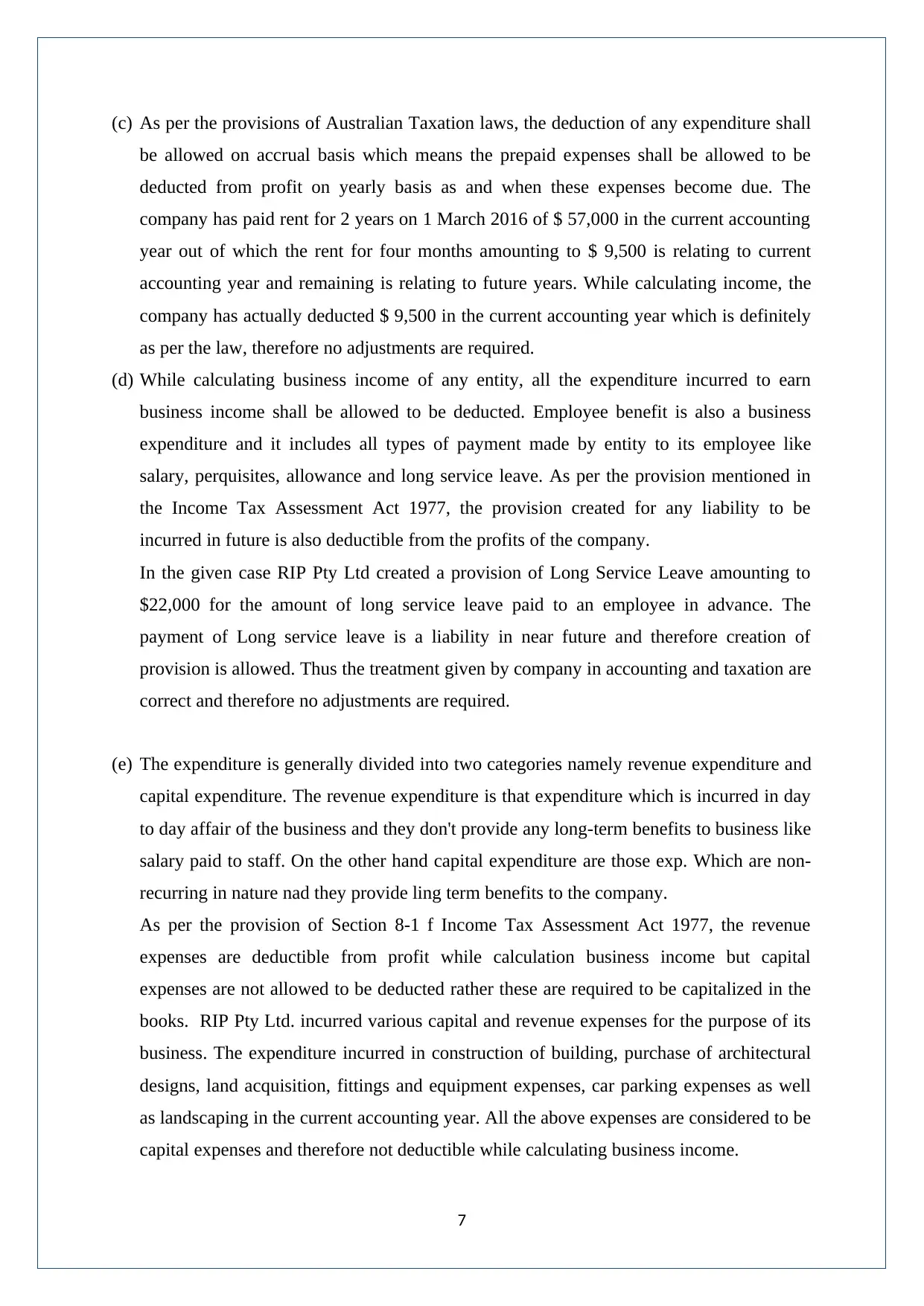
(c) As per the provisions of Australian Taxation laws, the deduction of any expenditure shall
be allowed on accrual basis which means the prepaid expenses shall be allowed to be
deducted from profit on yearly basis as and when these expenses become due. The
company has paid rent for 2 years on 1 March 2016 of $ 57,000 in the current accounting
year out of which the rent for four months amounting to $ 9,500 is relating to current
accounting year and remaining is relating to future years. While calculating income, the
company has actually deducted $ 9,500 in the current accounting year which is definitely
as per the law, therefore no adjustments are required.
(d) While calculating business income of any entity, all the expenditure incurred to earn
business income shall be allowed to be deducted. Employee benefit is also a business
expenditure and it includes all types of payment made by entity to its employee like
salary, perquisites, allowance and long service leave. As per the provision mentioned in
the Income Tax Assessment Act 1977, the provision created for any liability to be
incurred in future is also deductible from the profits of the company.
In the given case RIP Pty Ltd created a provision of Long Service Leave amounting to
$22,000 for the amount of long service leave paid to an employee in advance. The
payment of Long service leave is a liability in near future and therefore creation of
provision is allowed. Thus the treatment given by company in accounting and taxation are
correct and therefore no adjustments are required.
(e) The expenditure is generally divided into two categories namely revenue expenditure and
capital expenditure. The revenue expenditure is that expenditure which is incurred in day
to day affair of the business and they don't provide any long-term benefits to business like
salary paid to staff. On the other hand capital expenditure are those exp. Which are non-
recurring in nature nad they provide ling term benefits to the company.
As per the provision of Section 8-1 f Income Tax Assessment Act 1977, the revenue
expenses are deductible from profit while calculation business income but capital
expenses are not allowed to be deducted rather these are required to be capitalized in the
books. RIP Pty Ltd. incurred various capital and revenue expenses for the purpose of its
business. The expenditure incurred in construction of building, purchase of architectural
designs, land acquisition, fittings and equipment expenses, car parking expenses as well
as landscaping in the current accounting year. All the above expenses are considered to be
capital expenses and therefore not deductible while calculating business income.
7
be allowed on accrual basis which means the prepaid expenses shall be allowed to be
deducted from profit on yearly basis as and when these expenses become due. The
company has paid rent for 2 years on 1 March 2016 of $ 57,000 in the current accounting
year out of which the rent for four months amounting to $ 9,500 is relating to current
accounting year and remaining is relating to future years. While calculating income, the
company has actually deducted $ 9,500 in the current accounting year which is definitely
as per the law, therefore no adjustments are required.
(d) While calculating business income of any entity, all the expenditure incurred to earn
business income shall be allowed to be deducted. Employee benefit is also a business
expenditure and it includes all types of payment made by entity to its employee like
salary, perquisites, allowance and long service leave. As per the provision mentioned in
the Income Tax Assessment Act 1977, the provision created for any liability to be
incurred in future is also deductible from the profits of the company.
In the given case RIP Pty Ltd created a provision of Long Service Leave amounting to
$22,000 for the amount of long service leave paid to an employee in advance. The
payment of Long service leave is a liability in near future and therefore creation of
provision is allowed. Thus the treatment given by company in accounting and taxation are
correct and therefore no adjustments are required.
(e) The expenditure is generally divided into two categories namely revenue expenditure and
capital expenditure. The revenue expenditure is that expenditure which is incurred in day
to day affair of the business and they don't provide any long-term benefits to business like
salary paid to staff. On the other hand capital expenditure are those exp. Which are non-
recurring in nature nad they provide ling term benefits to the company.
As per the provision of Section 8-1 f Income Tax Assessment Act 1977, the revenue
expenses are deductible from profit while calculation business income but capital
expenses are not allowed to be deducted rather these are required to be capitalized in the
books. RIP Pty Ltd. incurred various capital and revenue expenses for the purpose of its
business. The expenditure incurred in construction of building, purchase of architectural
designs, land acquisition, fittings and equipment expenses, car parking expenses as well
as landscaping in the current accounting year. All the above expenses are considered to be
capital expenses and therefore not deductible while calculating business income.
7
Paraphrase This Document
Need a fresh take? Get an instant paraphrase of this document with our AI Paraphraser
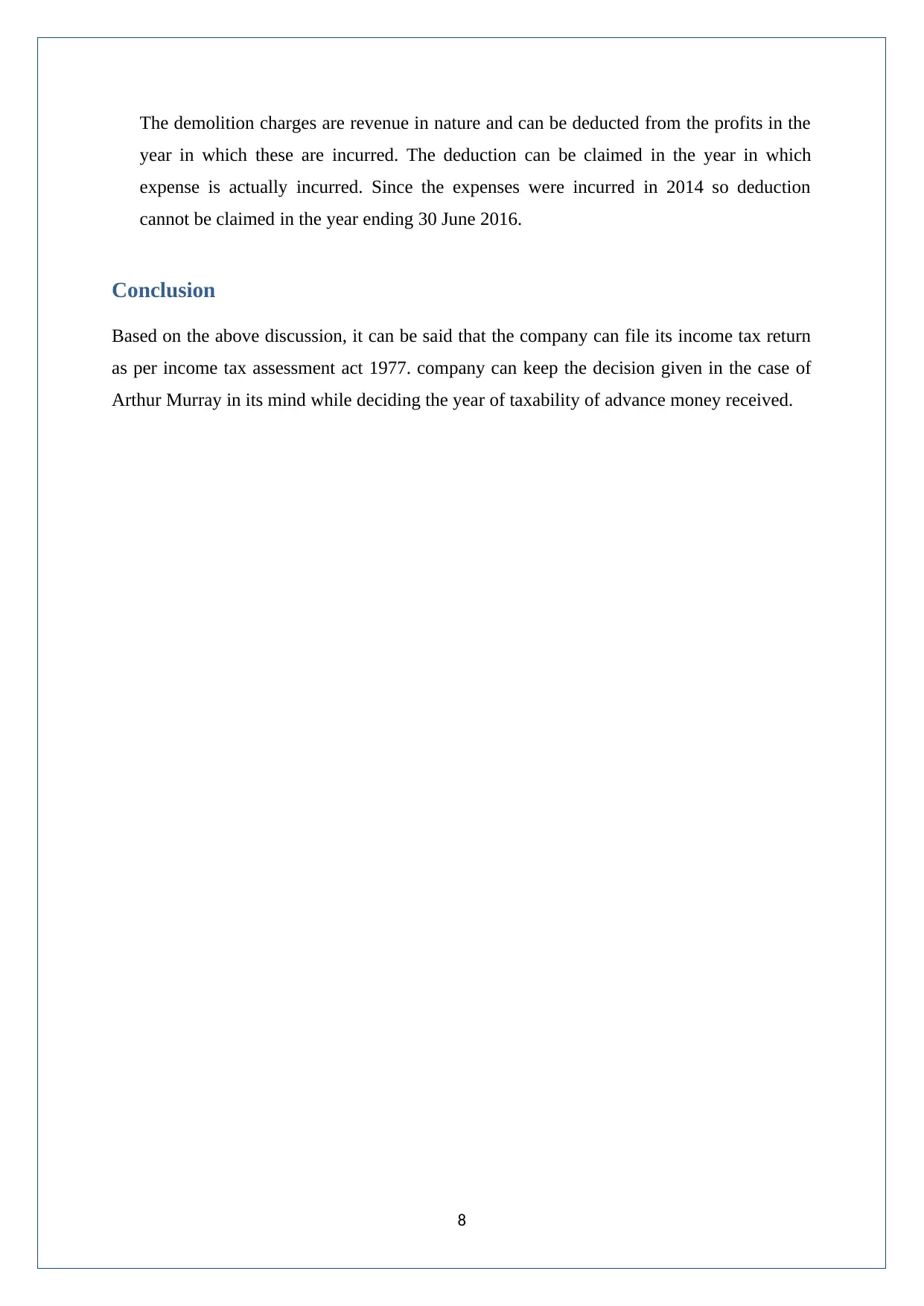
The demolition charges are revenue in nature and can be deducted from the profits in the
year in which these are incurred. The deduction can be claimed in the year in which
expense is actually incurred. Since the expenses were incurred in 2014 so deduction
cannot be claimed in the year ending 30 June 2016.
Conclusion
Based on the above discussion, it can be said that the company can file its income tax return
as per income tax assessment act 1977. company can keep the decision given in the case of
Arthur Murray in its mind while deciding the year of taxability of advance money received.
8
year in which these are incurred. The deduction can be claimed in the year in which
expense is actually incurred. Since the expenses were incurred in 2014 so deduction
cannot be claimed in the year ending 30 June 2016.
Conclusion
Based on the above discussion, it can be said that the company can file its income tax return
as per income tax assessment act 1977. company can keep the decision given in the case of
Arthur Murray in its mind while deciding the year of taxability of advance money received.
8
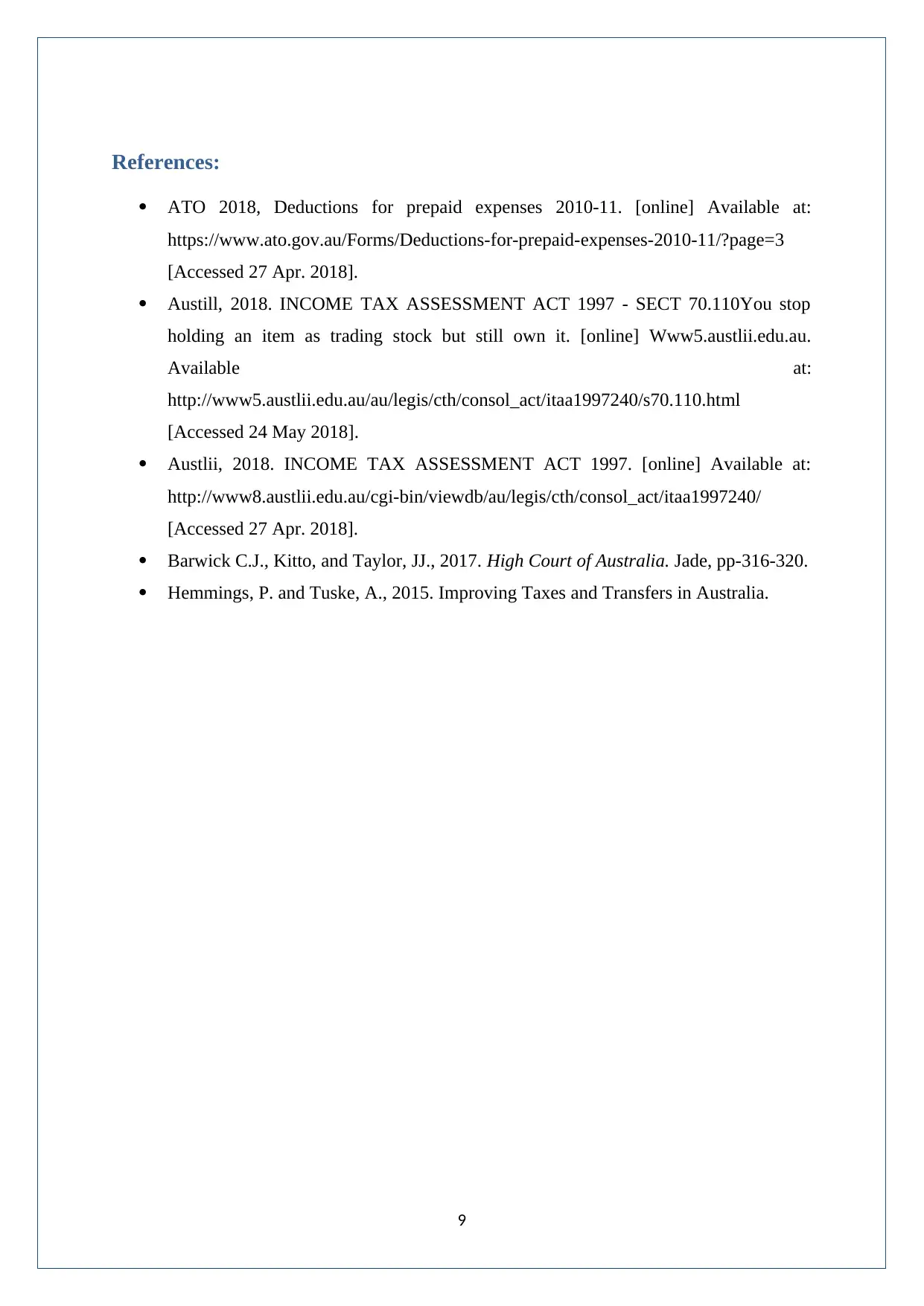
References:
ATO 2018, Deductions for prepaid expenses 2010-11. [online] Available at:
https://www.ato.gov.au/Forms/Deductions-for-prepaid-expenses-2010-11/?page=3
[Accessed 27 Apr. 2018].
Austill, 2018. INCOME TAX ASSESSMENT ACT 1997 - SECT 70.110You stop
holding an item as trading stock but still own it. [online] Www5.austlii.edu.au.
Available at:
http://www5.austlii.edu.au/au/legis/cth/consol_act/itaa1997240/s70.110.html
[Accessed 24 May 2018].
Austlii, 2018. INCOME TAX ASSESSMENT ACT 1997. [online] Available at:
http://www8.austlii.edu.au/cgi-bin/viewdb/au/legis/cth/consol_act/itaa1997240/
[Accessed 27 Apr. 2018].
Barwick C.J., Kitto, and Taylor, JJ., 2017. High Court of Australia. Jade, pp-316-320.
Hemmings, P. and Tuske, A., 2015. Improving Taxes and Transfers in Australia.
9
ATO 2018, Deductions for prepaid expenses 2010-11. [online] Available at:
https://www.ato.gov.au/Forms/Deductions-for-prepaid-expenses-2010-11/?page=3
[Accessed 27 Apr. 2018].
Austill, 2018. INCOME TAX ASSESSMENT ACT 1997 - SECT 70.110You stop
holding an item as trading stock but still own it. [online] Www5.austlii.edu.au.
Available at:
http://www5.austlii.edu.au/au/legis/cth/consol_act/itaa1997240/s70.110.html
[Accessed 24 May 2018].
Austlii, 2018. INCOME TAX ASSESSMENT ACT 1997. [online] Available at:
http://www8.austlii.edu.au/cgi-bin/viewdb/au/legis/cth/consol_act/itaa1997240/
[Accessed 27 Apr. 2018].
Barwick C.J., Kitto, and Taylor, JJ., 2017. High Court of Australia. Jade, pp-316-320.
Hemmings, P. and Tuske, A., 2015. Improving Taxes and Transfers in Australia.
9
1 out of 9
Related Documents
Your All-in-One AI-Powered Toolkit for Academic Success.
+13062052269
info@desklib.com
Available 24*7 on WhatsApp / Email
![[object Object]](/_next/static/media/star-bottom.7253800d.svg)
Unlock your academic potential
© 2024 | Zucol Services PVT LTD | All rights reserved.





